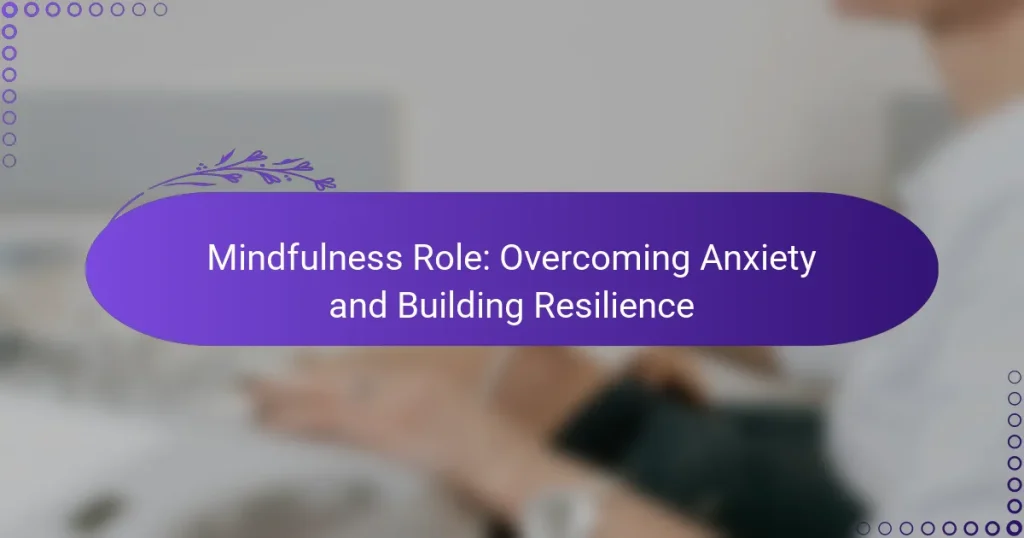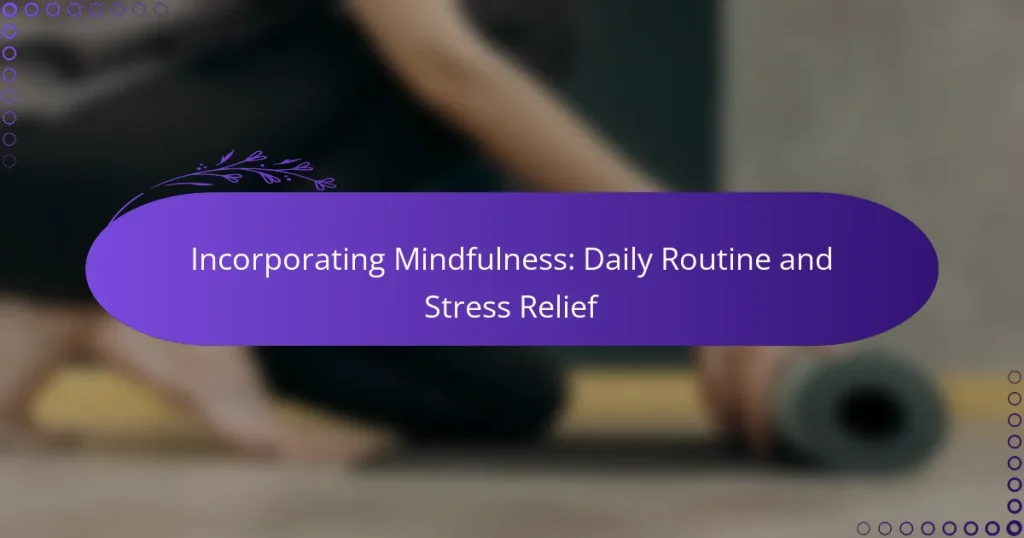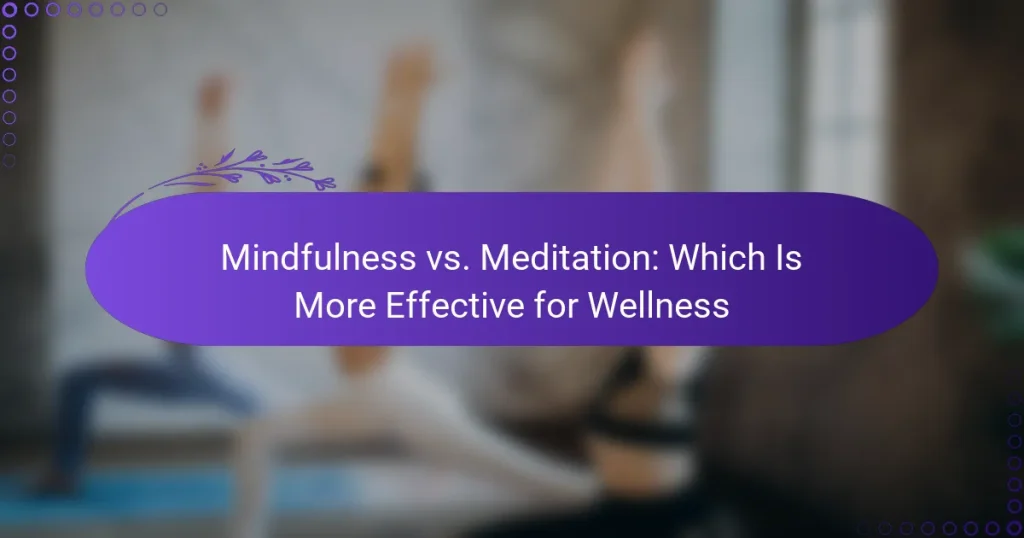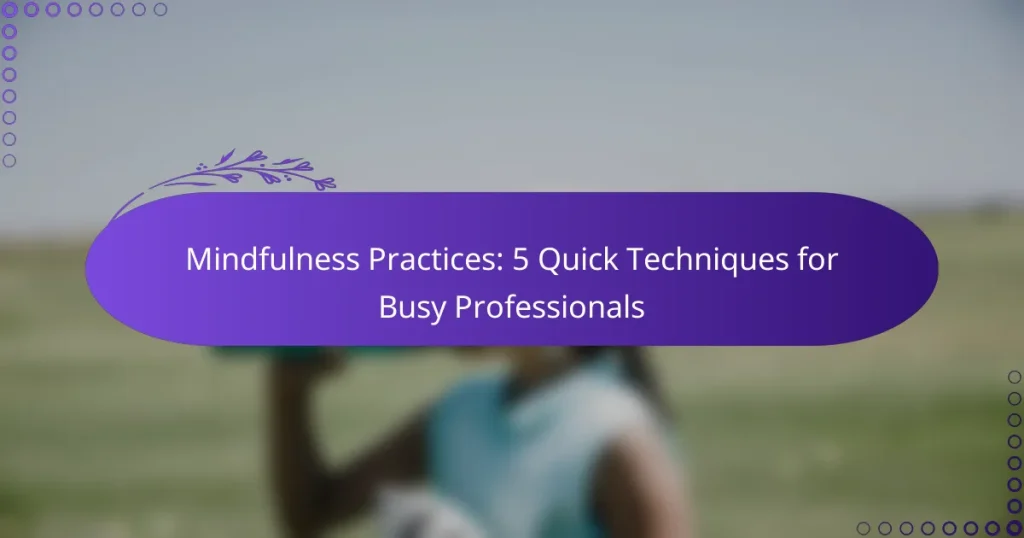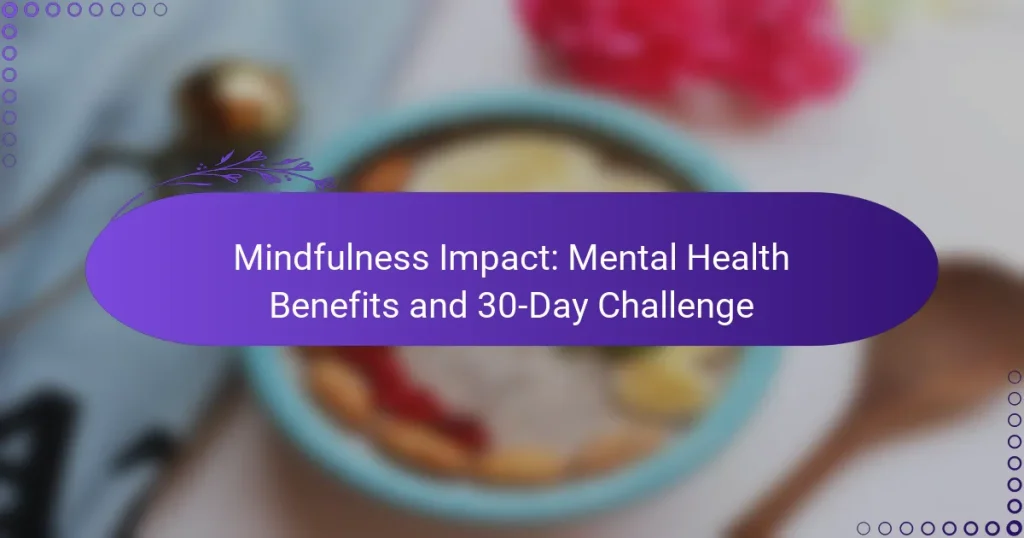Mindfulness techniques play a crucial role in achieving holistic wellness by fostering mental clarity, emotional stability, and physical health. By integrating practices such as meditation, breathwork, and mindful eating into daily routines, individuals can cultivate a more balanced and fulfilling life. Embracing these techniques not only reduces stress but also enhances overall well-being, allowing for a deeper connection to the present moment.
Incorporating Mindfulness: Daily Routine and Stress Relief
Mindfulness vs. Meditation: Which Is More Effective for Wellness
Mindfulness Practices: 5 Quick Techniques for Busy Professionals
Mindfulness for Relationships: Tips for Couples
Mindfulness Apps: Top 7 Picks for Beginners
Mindfulness Impact: Mental Health Benefits and 30-Day Challenge
What mindfulness techniques improve holistic wellness?
Mindfulness techniques enhance holistic wellness by promoting mental clarity, emotional stability, and physical health. Incorporating practices like meditation, breathwork, yoga, mindful eating, and nature immersion can lead to a more balanced and fulfilling life.
Meditation for stress reduction
Meditation is a powerful tool for reducing stress by fostering a state of relaxation and focus. Regular practice, even for just a few minutes daily, can help lower cortisol levels and improve overall mental health.
To start, find a quiet space, sit comfortably, and focus on your breath or a specific mantra. Aim for 5-10 minutes initially, gradually increasing the duration as you become more comfortable with the practice.
Breathwork for emotional balance
Breathwork involves various techniques that regulate breathing patterns to enhance emotional well-being. By consciously controlling your breath, you can reduce anxiety and promote a sense of calm.
Simple techniques include deep diaphragmatic breathing and the 4-7-8 method, where you inhale for 4 seconds, hold for 7 seconds, and exhale for 8 seconds. Practicing these techniques for a few minutes each day can significantly improve emotional balance.
Yoga for physical health
Yoga combines physical postures, breathing exercises, and meditation to improve physical health and flexibility. Regular practice can enhance strength, balance, and overall fitness while reducing tension in the body.
Consider attending classes or following online tutorials that suit your level, starting with gentle styles like Hatha or Yin yoga. Aim for at least two sessions per week to experience noticeable benefits.
Mindful eating for nutrition
Mindful eating encourages awareness of the eating experience, promoting healthier food choices and better digestion. By paying attention to hunger cues and savoring each bite, you can cultivate a more positive relationship with food.
To practice mindful eating, eliminate distractions during meals, chew slowly, and reflect on the flavors and textures of your food. This approach can help prevent overeating and improve nutritional intake.
Nature immersion for mental clarity
Immersing yourself in nature can significantly enhance mental clarity and reduce stress. Spending time outdoors has been shown to improve mood and cognitive function.
Try to spend at least 20-30 minutes in a natural setting each week, whether it’s a park, forest, or beach. Activities like walking, hiking, or simply sitting in nature can help refresh your mind and boost overall well-being.
How can mindfulness techniques be integrated into daily life?
Mindfulness techniques can be seamlessly woven into daily life by incorporating simple practices that promote awareness and presence. These techniques can enhance mental clarity, reduce stress, and improve overall well-being when consistently applied throughout the day.
Morning mindfulness routines
Starting your day with a mindfulness routine can set a positive tone. Consider dedicating 5-10 minutes to meditation, deep breathing, or gentle stretching as soon as you wake up. This practice helps center your thoughts and prepares you for the day ahead.
Another effective morning technique is mindful journaling. Spend a few minutes writing down your thoughts, intentions, or gratitude, which can enhance focus and emotional clarity throughout the day.
Mindful breaks during work
Incorporating mindful breaks into your workday can significantly boost productivity and reduce stress. Aim for a 5-minute break every hour to step away from your desk, stretch, or practice deep breathing. This short pause helps refresh your mind and body.
During these breaks, try to engage your senses. Notice the sounds around you, the feel of your chair, or the taste of your water. This sensory awareness can ground you and improve your focus when you return to work.
Evening reflection practices
Evening reflection practices allow you to unwind and process the day’s events. Spend 10-15 minutes before bed reflecting on your day, considering what went well and what you might improve. This can foster a sense of closure and promote restful sleep.
Consider incorporating a gratitude practice into your evening routine. Write down three things you are grateful for each day. This simple act can shift your mindset and enhance your overall outlook on life.
What are the benefits of mindfulness for wellness?
Mindfulness offers numerous benefits for overall wellness, including improved mental clarity, emotional stability, and physical health. By focusing on the present moment, individuals can reduce stress and enhance their quality of life.
Improved mental health
Practicing mindfulness can significantly enhance mental health by reducing symptoms of anxiety and depression. Techniques such as meditation and deep breathing help calm the mind, allowing for clearer thinking and better emotional regulation.
Regular mindfulness practice can lead to a more positive outlook and increased resilience against daily stressors. Engaging in mindfulness for just a few minutes each day can yield noticeable improvements in mood and cognitive function.
Enhanced emotional resilience
Mindfulness fosters emotional resilience by encouraging individuals to observe their thoughts and feelings without judgment. This practice helps in recognizing emotional triggers and developing healthier responses to stress.
By cultivating a non-reactive awareness, individuals can better manage difficult emotions and bounce back from setbacks. Techniques such as journaling or guided imagery can further support this growth, making it easier to navigate life’s challenges.
Better physical health outcomes
Mindfulness has been linked to various positive physical health outcomes, including lower blood pressure and improved immune function. By reducing stress, mindfulness can decrease inflammation and promote overall well-being.
Incorporating mindfulness into daily routines, such as mindful eating or walking, can enhance physical health. Simple practices like focusing on breath during exercise can lead to more effective workouts and greater enjoyment of physical activities.
What prerequisites are needed for practicing mindfulness?
To practice mindfulness effectively, an open mindset for learning and a commitment to regular practice are essential. These prerequisites help individuals engage fully with mindfulness techniques and cultivate a lasting habit.
Open mindset for learning
An open mindset is crucial for embracing mindfulness. This involves being willing to explore new ideas and techniques without preconceived notions or judgments. Approaching mindfulness with curiosity allows practitioners to experience its benefits more profoundly.
To develop an open mindset, consider setting aside any skepticism about mindfulness practices. Engage in discussions, read literature on the subject, or attend workshops to broaden your understanding. This exploration can enhance your ability to integrate mindfulness into daily life.
Commitment to regular practice
Regular practice is vital for reaping the benefits of mindfulness. Consistency helps reinforce the techniques and makes them a natural part of your routine. Aim for short, daily sessions, gradually increasing duration as you become more comfortable.
Start with just a few minutes each day, focusing on your breath or a simple meditation. As you progress, you can explore various mindfulness exercises, such as body scans or mindful walking. Establishing a specific time and place for practice can help solidify this commitment.
How do mindfulness techniques vary by location?
Mindfulness techniques can differ significantly based on geographical and cultural contexts. Urban areas may emphasize quick, accessible practices, while rural settings often focus on immersive, nature-based experiences.
Urban mindfulness practices
In cities, mindfulness practices are often designed for busy lifestyles, incorporating short sessions that can fit into a hectic schedule. Techniques such as guided meditation apps, lunchtime yoga classes, and mindfulness workshops in corporate settings are common. These practices typically focus on stress reduction and enhancing productivity.
Urban mindfulness may also include community events like group meditations in parks or mindfulness-based stress reduction (MBSR) programs offered by local health organizations. These initiatives encourage participation and foster a sense of community among city dwellers.
Rural mindfulness retreats
Rural mindfulness retreats provide an opportunity for deeper immersion in nature, often lasting several days or weeks. These retreats typically focus on holistic wellness, combining mindfulness with activities like hiking, gardening, or yoga in serene environments. Participants can disconnect from daily distractions and engage in reflective practices.
Many rural retreats emphasize the importance of nature in mindfulness, encouraging practices such as forest bathing or silent walks. These experiences promote relaxation and self-discovery, allowing individuals to reconnect with themselves and their surroundings in a tranquil setting.
